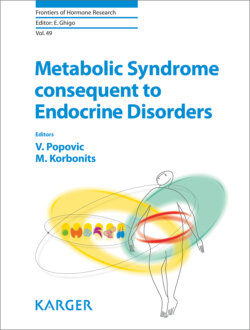Читать книгу Metabolic Syndrome Consequent to Endocrine Disorders - Группа авторов - Страница 25
На сайте Литреса книга снята с продажи.
Newer Data on Metabolic and Cardiovascular Outcome in Patients with Hypopituitarism on Long-Term GHRT
ОглавлениеIn the last years abundance of new data became available regarding metabolic and cardiovascular outcomes in patients with hypopituitarism. Meta analysis of 6 studies up to 2014 reporting a total of 19,153 patients confirmed 2-fold increased overall mortality for hypopituitarism, especially in female and patients diagnosed at younger age [97]. GHRT improved mortality risk in hypopituitary adults that was comparable to the background population, but this benefit was lower for women than man [97]. These data are similar to the latest Swedish nationwide study reporting increased SMRs for patients diagnosed with NFPA (the most common cause of adult hypopituitarism) at age younger than 40 years and women with hypopituitarism and diabetes insipidus [98]. SMRs were also increased for cerebrovascular and infectious diseases and decreased for malignant tumors in hypopituitary patients with NFPA etiology [98]. These trends of increased mortality in female patients appear to be declining, at least for women diagnosed during the last decade (after 2007), possibly due to decreasing prevalence of pituitary insufficiency and better replacement [99]. Another analysis, of life expectancy in hypopituitary patients with NFPA, confirmed that patients receiving long-term GHRT had reduced overall mortality compared to the general population [100]. Death from malignancy was not increased and long-term GHRT appeared to be safe in adult patients selected for treatment [100]. Similar findings were reported from HypoCCS database [101]. There was no increased risk for all-site cancers, breast, prostate, or colorectal cancers in GH-treated patients [101]. Furthermore, GHRT did not increase the risk of pituitary adenoma or craniopharyngeoma recurrences [101]. Another systematic review and meta-analysis, which included 15 studies published from 1995 to 2015 and total of 46,148 patients, supported the overall safety of GHRT in adults with hypopituitarism with no clear evidence of increased risk of pituitary tumor recurrence, malignancy, or stroke [97]. Hypertension and age >55 years were found to be major prognosticators of adverse cardiovascular outcome in non-diabetic patients with GHD during the long-term follow-up (12 years) suggesting the need for optimal control of all cardiovascular risk factors especially hypertension in these patients [102]. The most recent data showed reduced all-cause mortality (and death from malignancy) in hypopituitary patients with NFPA treated with GHRT suggesting that long-term GHRT is safe in these patients [103].
